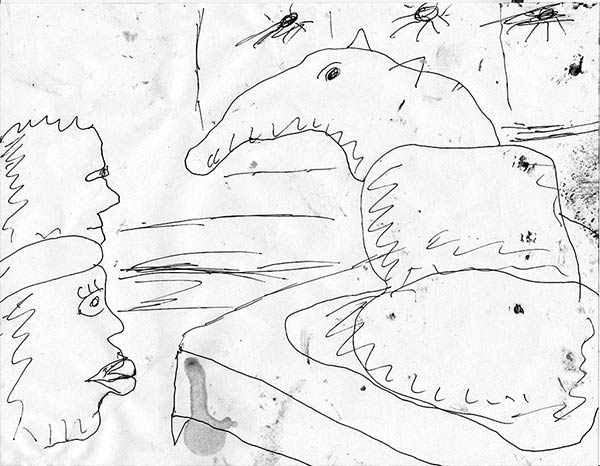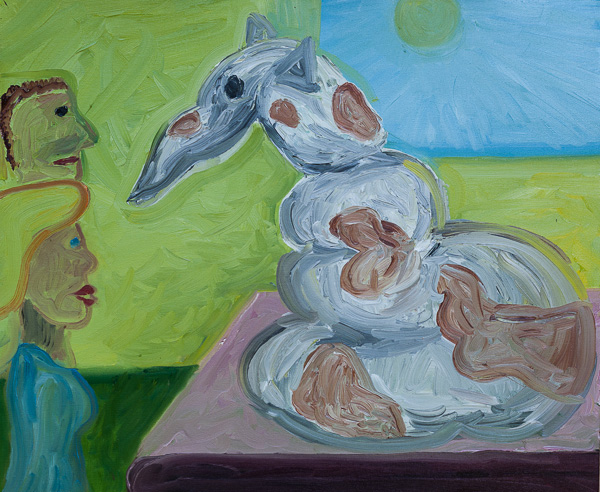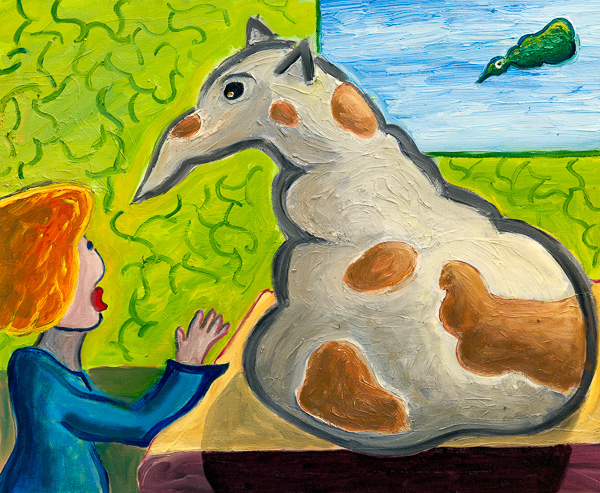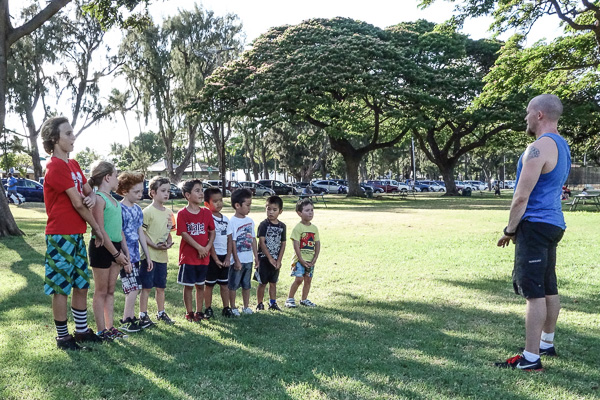My Kickstarter campaign to fund my next novel The Big Aha is coming along well—and many thanks to my backers. With any luck we may pass my targeted goal this week. [Update: We passed the target of $7,000 on June 25, 2013.]

Like a door opening up in the heavens! A glorious tunnel in the sky to Parnassus.
Last year I figured out the mechanics of making a novel into an ebook and a print book and getting it distributed online and even in few bookstores. It’s a more complex process than I realized at first—I put most of what I learned about making ebooks into a series of 4 blog posts, “How To Make Ebooks #1 – #4”. And with some trace of irony, I combined this material and cleaned it up a bit to make an ebook called How To Make An Ebook. And making a print book with InDesign is a whole other story, but I’ll blog about that at some later time.

Anyway, the point that I want to make today is that, once you know how to make and distribute your own ebook and print books, one of the main things you’d still want to have a publisher for is to pay you an advance on the royalties for your expected sales.
But, with any luck, Kickstarter lets you sidestep this need. Given that all of my backers will get an ebook of THE BIG AHA (and in some cases an paper copy as well), I am in effect doing advance sales. So in some ways the process is very similar to getting an advance from a publisher.

My readers are in effect my publisher now—and they’re kindly paying me my advance. With no intermediaries. Even better, they’re offering me more than precise remunerations for the goods offered, they’re open-handedly and generously encouraging me to continue my work by paying extra. So there’s an element of getting a grant here too.
I was discussing some of these issues with the writer Tim Pratt last month and he used a word I like. Disintermediation. As in, “Electronic publication really calls for disintermeditation.” That is, selling your creations as directly as possible to your consumers. With fewer and fewer intermediaries.

Sketch for “A Gub On Her Bed.”
Enough biz for the moment.
I have some creatures called gubs in The Big Aha . They appeared fairly early in my novel—I wrote about them in blog post called “Gubs and Raths” in November, 2012. At that point I just viewed as insignificant pests, on a level with dogs or pet pigs or rabbits.
But now, as I’m moving into the final chapters of my novel, I’m realizing that the gubs are incredibly powerful alien beings—very nearly at the level of gods. And I’m trying to get a clearer mental image of them.
So I made a nice lively sketch as shown above, kind of funny, at least to my eyes, messy, it only took a minute or two, and now I’m trying to translate that into an oil painting.

Draft #1 of Painting for “A Gub On Her Bed.”
What’s going on here is that a spotted gub is sitting on the bed in the apartment where my woman hero Jane lives. And Jane’s husband Zad is visiting, and they’re looking with some dismay at the fairly grubby gub on Jane’s bed. The spotted gub’s name is Duffie. They want him to leave.
This is only the first draft of the painting, and, yes, I know it doesn’t look that great yet. It’ll take maybe three more sessions to finish it. The gub looks funnier in the sketch with the slack neck and kind of looking over his shoulder; I want to put more texture into the wallpaper; give the gub some little paws; Zad and Jane should look livelier; there ought to be some object in the upper right corner like maybe a mobile or possibly a tiny distant gub seen through the window. A gubbess.

“A Gub On Her Bed,” oil on canvas, June, 2013, 24” x 20”. Click for a larger version of the image.
So okay, on June 25, 2013, I got the third, and final, version done. Having two people made too much clutter, so I cut it down to just the woman and the gub. And I put a girl gub out there in the sky, she’s green, her name is Sedusa.
I always like the idea of a painting that seems like an illustration of some unknown proverb or fable. At a metaphorical level, the gub might symbolize some kind of marriage problem.
By the way, you can get paintings of mine as rewards for the higher levels of pledging to my Kickstarter for The Big Aha . If I raise enough money, I plan to make a nice new edition of my art book, Better Worlds. And I want to do some more paintings relating to the novel.

One more shift of gears in today’s post.
An issue which one of my backers raised is the question of whether I would miss having an editor—which is one of the other things that a publisher provides.
With commercial publishing in the underfunded state that it is, an author often gets very little in the way of editorial comments anymore. My sense is that the editors are mostly focused on acquisition and on promotion, and they tend not to have much time for tweaking your book.
This said, on many books, I’ve gotten a few telling remarks that really did make a difference. But over the years, I’ve been getting less advice all the time. Possibly at this point, with the experience I have, I don’t need so much editing advice anymore—maybe having an editor is more important when you’re starting out. This said, I do know there’s a danger of an unedited author letting his or her work bloat and become fatuous.

A simple editing option for indies is to show a draft of the book manuscript to a few trusted personal friends whose judgment you trust, friends who are willing to take the time you read your manuscript. Pretty much any kind of comment can be useful. You don’t have to do everything your friends suggest, but if something confuses them or throws them off, then it’s often pretty easy to fix it. And if you feel too unsure of what you’ve done, you can hire a freelance literary editor, although here you may be getting into dangerous waters, that is, you might pay a lot for advice that’s not necessarily very useful.
Whatever! My big issue right now is to write a few more scenes about Zad, Jane and the gubs!









June 24th, 2013 at 12:33 pm
I wanted to comment on the use of “readers as editors” for one’s manuscript. I have a colleague who has been using the same group of readers for a number of years now. They are familiar with his writing style, and by reading his work over the years they are also familiar with his series work. Recently he completed a novel (fifth in a series) for a NY publisher. As is true with most NY publishers these days, his manuscripts receive little if any editing, other than a final copy edit. He had his readers review the manuscript in sections (e.g. the first quarter, then the first half, etc.) and again once the manuscript was complete after he had included their feedback. He then submitted the manuscript to his agent and publisher. I had an opportunity to read the ms. after it was submitted. As I was reading I came upon three inconsistencies in the content with what had been previously written in the ms. (plus duplicate or dropped words, etc.) When I pointed these inconsistencies out to him, he informed me of two other instances that he had been made aware of, instances that I hadn’t gotten to yet. I didn’t say anything personal to the author, but it made me wonder about the value of his readers. Shouldn’t these inconsistencies and other errors have been caught by his readers? Isn’t this one of the reasons that an author has readers? — so that plot holes, inconsistencies, pacing, too much backstory, dropped words, etc. can be caught before the ms. is submitted? Does he need a new group of readers? Or, would he have achieved better results had he used a professional editor? There is, of course, a cost involved for that professional editor, whereas readers partake for the joy of being able to read the author’s work-in-process long before the book sees publication.
The Amazon Kindle store is full of self-published novels that had no professional editing. Once you get past the 5-star reviews that were probably posted by the author him/herself under a different login or by the author’s family and friends, and get to the two- and one-star reviews, you learn the true contents of the novel. Most of which begin something like: “I don’t know how this book received any 5-star reviews…” followed by comments regarding the ineptness of sentence structure, content that makes no sense, myriad typos and missing words, boring dialog, etc.
So, let me conclude this lengthy comment simply by saying to choose your readers carefully or, even wiser, though costlier, hire a competent, professional editor. Because, if the story is, indeed, a good story, then that editorial cost will be repaid with true 5-star reviews — and corresponding sales.
June 26th, 2013 at 5:18 am
Well done!
Readers? As martyh suggests readers are probably of limited usefulness, but they certainly are a first bar. Editing is work, work that requires special skill. How about profit sharing, or stock in the book as payment for a good editor — ya know in the spirit of silicon valley.
June 26th, 2013 at 9:00 am
To tell the truth, the EDITING isn’t really something I feel that great of a need for. I’ve been in the writing game for such a long time that I’m pretty confident about my overall book design and about my abilities to spot little inconsistencies. For me, hiring an editor to keep me in line would be a little like an escaped convict hiring someone to act like a prison guard…
It’s the PROOFREADING that’s the real issue for me. Here friends can be of some help, although, as Marty and Emilio point out, it’s common for non-editor type readers to just sail through a book and not notice any glitches at all. I used friends for TURING & BURROUGHS, and they did find plenty of typos but, disconcertingly enough, everyone seemed to find DIFFERENT typos. So it would be good to have maybe ten friends instead of three or four.
So you can hire a professional proofreader for a few hundred dollars—and I may do that this time, but I’m also thinking about a crowdsourcing trick I just came across. The trick is to put your final draft of your book on Google Docs as a private document, share the doc with anyone who’s volunteered to help you, and give them Comment permission but not Edit permission. And they can tag any as-yet untagged typos that they find. And then, in due time, you scan through the tagged Google document and input the corrections into your working doc.